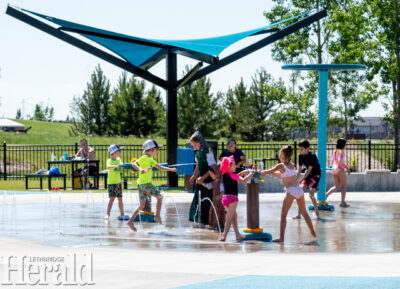Lethbridge residents ready to beat the heat
By Lethbridge Herald on July 8, 2024.
 Children play in the cool water at the Legacy Spray Park on Monday afternoon. The spray park now has extended hours, remaining open from 10 a.m. until 8 p.m.
Herald photo by Justin Sibbet
Children play in the cool water at the Legacy Spray Park on Monday afternoon. The spray park now has extended hours, remaining open from 10 a.m. until 8 p.m.
Herald photo by Justin SibbetJustin Sibbet – LETHBRIDGE HERALD – Local Journalism Initiative Reporter
As temperatures are set to soar into the high 30’s this week, the City of Lethbridge and Alberta Health Services are reminding residents to stay safe under the sun.
The City said in a media release on Monday that residents can access water at several locations around the city to maintain safe hydration levels or keep cool.
These locations include the public pools, spray parks and the drinking stations at four major parks. The spray parks at Legacy Regional Park and Galt Gardens have also been given extended hours, now operating from 10 a.m. to 8 p.m.
However, the City says there are also certain responsibilities held by citizens when managing the summer heat.
“Be mindful of the use of electric appliances and keep air-conditioning units at a moderate temperature to help prevent overloading the power grid.”
The City also reminds residents to be mindful of their water usage as reservoirs are still far from full.
“While current reservoir levels are almost at normal levels, voluntary water conservation efforts are still encouraged.”
The City also indicated in the release there are certain members of the community who are hit harder by heatwaves than others.
“The vulnerable members of our community are likely most at-risk during extreme temperatures without access to shelter.”
Even so, the City says there are several resources available to help those in need get into the shade, such as the Lethbridge Stabilization Centre and Shelter, Sik-Ooh-Kotoki Friendship Society, Lethbridge Public Library Main Branch and the Lethbridge Soup Kitchen.
Beyond resources available by the City, Alberta Health Services has tips from its website for those who may be experiencing heat stroke or other heat-related illnesses.
“Apply a sunscreen of at least sun protection factor (SPF) 30, at least 20 minutes before heading outdoors. Be sure the SPF 30 screens out both UVA and UVB rays and reapply frequently.”
More than just sunscreen, AHS recommends wearing light-coloured clothing to cover as much skin as possible. Furthermore, AHS says wearing wide-brimmed hats and maintaining a smart schedule will help as well.
“Consider rescheduling outdoor activities to cooler hours of the day.”
It is also recommended that residents choose water over other beverages.
“Drink plenty of water and other non-alcoholic, non-caffeinated beverages to stay hydrated.”
While many residents may be out in the heat just for a stroll through the park, others will be working in the manual labour sector. For them, AHS recommends avoiding overwork.
“Take frequent breaks from heat, spending time indoors.”
AHS says symptoms of heat stroke include a high body temperature, lack of sweat, disorientation, fainting or unconsciousness. Heat stroke is a medical emergency and 9-11 should be called.
If awaiting medical treatment, AHS says the individual in distress should be moved to a shaded area, have a damp towel placed around them and all outer layers of clothing removed.
Humans are not alone in combatting heat, though. Pets are subjected to the same high temperatures as we are.
Kyle West, a veterinarian with the Family Pet Hospital and 24-Hour Emergency Care, says there are several warning signs your animal may have when it is dealing with heat stroke.
“They’re quite often (out of energy) or panting heavily,” said West. “In some severe cases you can get seizures, they can get shock, secondary to it. They can have a number of issues with their organ function.”
He says he sees dogs more than any other animal regarding heat stroke, but there are ways to keep your pet safe.
“Keep them out of vehicles or even other enclosed spaces like sheds or garages,” said West.
He says exercise can be a big problem for animals on a hot day, but it is still safe to take dogs for a walk, so long as common sense is practiced.
“Generally, walks are fine, just make sure that there’s access to shade and water and we’re not doing heavy exercise, like playing rambunctiously for hours on end without some type of relief or break.”
As for cats, or any pet, that lives outdoors, West says it is important to ensure they still have access into the home or shaded area with water nearby.
“If they have mobility issues, like getting around, make sure that water is accessible where they can easily get to it.”
A common concern during high heat days is animal paws on the pavement. West says he rarely sees this as an issue but urges pet owners to be smart about where they walk their pets.
The final reminder from AHS is to never, “leave any person or pet inside a closed vehicle, ever.”
33-32




